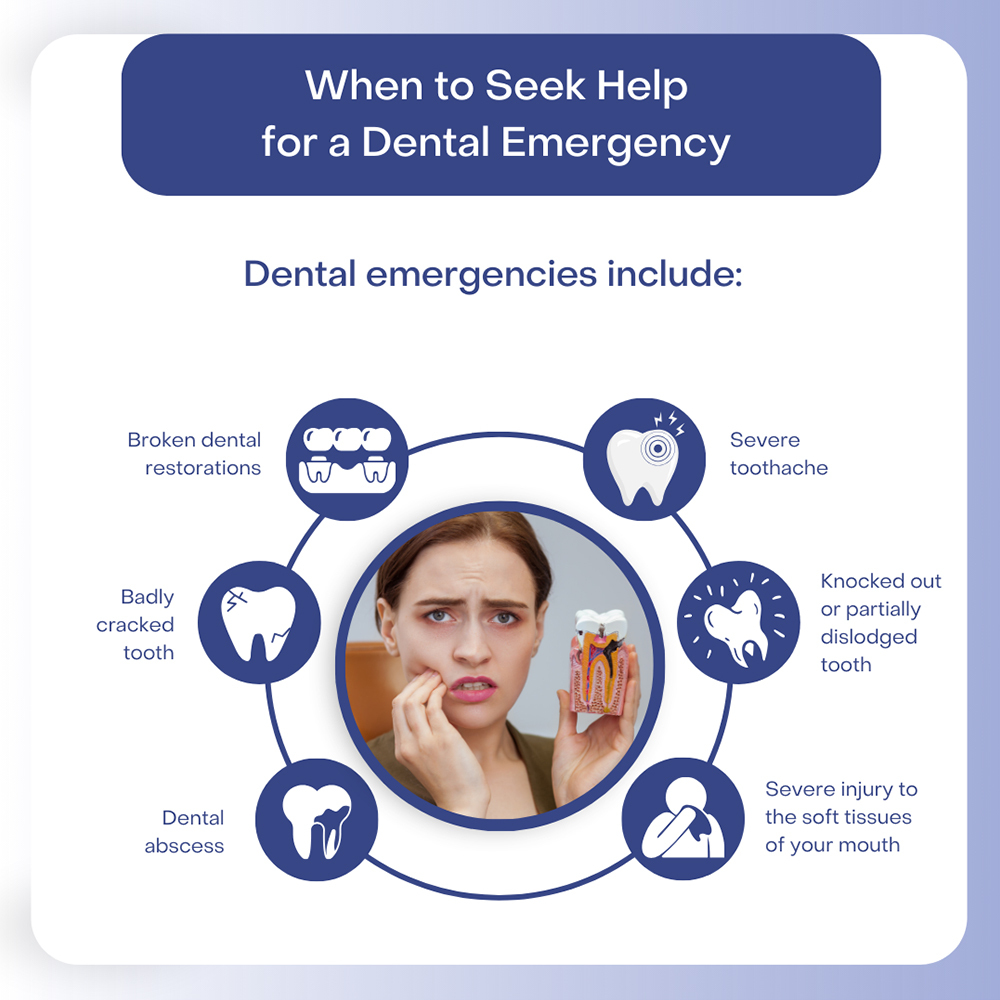Table of contents
Emergency dental care is when a problem needs urgent attention. These include issues such as severe toothache that may be causing other symptoms as well, bleeding from your cheeks, lips, and gums that won’t stop, or facial trauma that has resulted in knocked out or partially avulsed teeth or damaged facial bones.
We know some dental emergencies can be upsetting and even a bit frightening. When you contact us, our compassionate dental team can offer advice on dealing with the emergency until we can schedule a visit with our emergency dentist. When someone is in pain or needs urgent dental care in Hackensack, we try to see them quickly, preferably on the same day.

Dental emergencies include:
Below is some information on how to manage these dental emergencies until you can come and see us.
Rinse your mouth thoroughly using warm water and gently floss around the tooth to remove any impacted food. Sometimes, a small piece of food can become trapped between your teeth and is enough to dislodge a tooth slightly, causing pain.
Use over-the-counter pain relief to control discomfort. Please don’t put painkillers directly on the gum or tooth because they can burn them. If you have facial swelling, gently press a cold compress onto your cheek to help relieve it.
Severe toothache is a sign that something is wrong, so even if it disappears, please schedule an appointment to come and see us.
If you knock out a tooth, pick it up carefully by the crown, the part of the tooth normally visible in your mouth, and rinse away any dirt with water. Don’t touch the tooth root or try to remove any tissue fragments.
Try to carefully reinsert the tooth, ensuring it faces the right way, but don’t force it back into place. Otherwise, store the tooth in a small container with a little milk or water and a pinch of salt and bring it to your appointment. You can also purchase tooth preservation solutions from drugstores.
Come and see us immediately; we have the best chance of saving your tooth if we can reinsert it within an hour of the accident.
When a tooth is partially knocked out, you must still see us immediately. Until you can, take over-the-counter pain relief and use a cold compress to help reduce swelling and pain.
If soft tissues like your tongue, lips, gums or cheeks are bleeding due to dental injury, follow these steps:
An abscess is an infection around the tooth root and can severely damage teeth and surrounding tissues. It can cause a pimple on the gum that is filled with pus. A dental abscess can affect general health without prompt emergency dental care.
If you think you may have an abscess, come and see us quickly. Until you can get here, rinse your mouth with a saltwater solution several times a day, as this will help ease the pain and draw pus to the gum surface.
Remove any pieces of tooth from your mouth and save them to bring to your appointment. Rinse your mouth with warm water to remove any other debris.
If your mouth is bleeding, use a clean piece of moist gauze to apply pressure to the area for 10 or 15 minutes until the bleeding stops. A cold compress pressed onto the outside of your cheek nearest the broken tooth will help relieve pain and reduce swelling. Come and see us as soon as possible.
Dental restorations like crowns, bridges or fillings can break, fall out, or become dislodged as they age.
If you break a restoration, make an appointment to come and see us as quickly as possible and bring the restoration with you. It may be possible to clean the restoration and re-cement in your mouth. Please do not try to glue the restoration back in place yourself. Household glue is often toxic and can damage the tooth and the restoration.
If you lose a filling, try inserting a small piece of sugar-free gum into the cavity to protect the tooth until you can get the filling replaced.
Dental emergencies can cause extreme pain and, if neglected, may have life-threatening consequences. Seeking care promptly is crucial. For swift diagnosis, treatment, and pain relief, consulting a dentist who specializes in handling emergencies is essential. These professionals excel at diagnosing and treating acute dental issues, such as fractures, dislocations, infections, and bleeding after surgery or extractions. Their expertise can minimize the need for lengthy dental procedures and even save lives.
If you’re looking for an emergency dentist nearby, here are a few tips:
My New Jersey Dentist offers walk-in urgent dental care for quick and hassle-free relief. Our services are available 24/7 because we understand that emergencies can strike at any time. With a wide range of accessible dental treatments, we can address any emergency you may encounter. We work with you to create a treatment plan that aligns with your budget and insurance coverage. Our top priority is providing excellent care in a welcoming and comfortable environment.
Some situations require urgent dental care but are not an emergency.
These can include the following:
When you initially contact us, we will ask about your emergency to assess its urgency. Even if you don’t need to see your Hackensack dentist immediately, we can provide useful advice over the phone.
Some dental emergencies are unavoidable, but good preventive dentistry can often lower your risk and reduce their severity. Ensuring you brush and floss regularly and visit us for checkups and hygiene appointments can help you maintain a healthy mouth and strong teeth and gums more easily.
Anyone who plays sports should consider a custom mouthguard. A mouthguard can help reduce the risk of serious injuries to your teeth, jaws, and soft tissues and is a great investment in your dental health.
If you notice any changes to your dental health between appointments, such as a nagging toothache or discomfort, please get in touch with us. The sooner we can treat a dental problem, the lower the risk of it developing into a dental emergency.

My name is Victoria Kushensky. I am a general dentist dedicated to remaining at the forefront of my field. Combining compassionate care with extensive knowledge, I offer cosmetic and general dentistry services as well as advanced root canal treatments.
I earned my Doctor of Dental Surgery (DDS) degree from the esteemed New York University College of Dentistry. Throughout my career, I have honed my skills in various dental procedures, ensuring effective treatment for each patient’s unique needs. I prioritize patient comfort and understanding, taking the time to thoroughly explain procedures and address any questions.
More about Dr. KushenskyMy NJ Dentist: Victoria Kushensky, DDS
385 Prospect Ave Suite 304
Hackensack, NJ 07601
(201) 298-8000